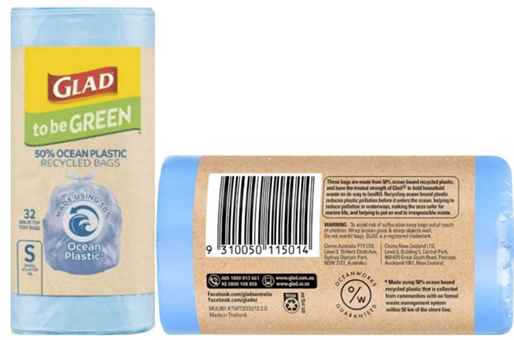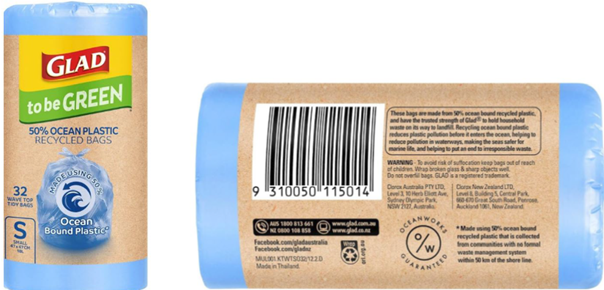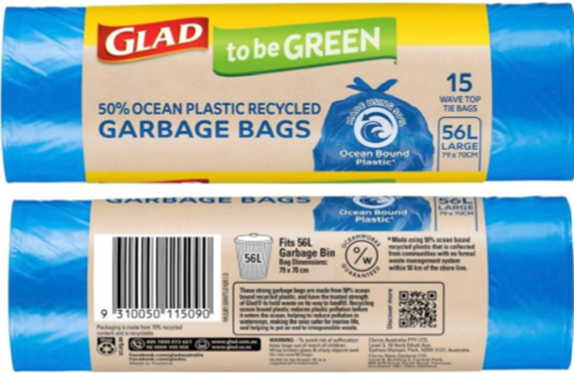On 14 April 2025, Clorox was fined $8.25 million for making misleading representations that its kitchen and garbage bags were “50% OCEAN PLASTIC”.
The ACCC had sued Clorox, arguing that its advertising claim suggested that the recycled plastic used to make Clorox bags was “found in the ocean”. In fact, these bags were made from recycled plastic that was collected within 50kms of coastlines in communities with no formal waste management systems. At most, the plastic was “bound for the ocean”. This significant penalty is a clear warning to companies making environmental claims and reinforces the importance of making sure headline claims are honest and not just attention grabbing, pithy bits of marketing, changed in meaning by fine-print.
Key Takeaways
- When designing an advertising campaign, ensure there you have enough time before your campaign launch to obtain legal advice on it from a lawyer experienced in advertising and marketing law.
- Know that advertising and marketing claims in the environmental and sustainability space are a top priority of the ACCC, particularly in relation to products that are widely used by consumers.
- Remember that the test for assessing the meaning of advertising claims is a “reasonable consumer test”, so where the meaning of a claim is not clear, include enough information in the claim to make it clear.
- Do not rely on fine-print or disclaimers on the back or side of your pack to change the meaning of a headline claim on the front of the pack. They will not be read by consumers and they will not save you in Court. You need to make your claims clear front of pack.
Rationale for Decision
The Federal Court held that Clorox’s $8.25 million penalty was appropriate given it sold 2.2 million products as part of this campaign, in addition to the following aspects of Clorox’s product packaging:
- Use of the phrase “50% OCEAN PLASTIC RECYCLED BAGS” in large blue font on the front and side of its packaging;
- “GLAD to be GREEN” in large font, with a green coloured background emphasising the words “to be GREEN”;
- On the original packaging (image 1 below), the phrase “Ocean Bound Plastic” appeared in smaller font on the side of each type of packaging;
- On the updated packaging (images 2 and 3 below), the phrase “Ocean Bound Plastic” was moved to the front, but the larger, prominent headline “50% OCEAN PLASTIC” remained;
- The blue colour of the products, and the image of waves on the packaging which contributed to an overall impression that the Products were made from plastic collected directly from the ocean. [1]



The Federal Court ruled that Clorox failed to consider that the ordinary consumer would interpret “OCEAN PLASTIC”, especially considering the wave imagery and blue colouring on the bag, text and label, as “connoting a relationship between the products and the ocean”. Furthermore, the “GREEN” label indicated “environmental friendliness”, which, in conjunction with the ocean imagery, were considered “important contextual matters in assessing the contravening conduct”.
Clorox admitted that its “Ocean Bound” qualifier, even when more visible on its updated packaging, was insufficient to convey to the ordinary consumer that the recycled plastic was merely bound for the ocean. Rather than accurately representing that the plastic was being collected up to 50km from the coast from communities lacking formal waste management systems, Clorox acknowledged that the packaging implied that the plastic was found in the ocean.
Other Orders
In addition to imposing a pecuniary penalty of $8.25 million, the Federal Court granted an injunction against Clorox, preventing it from making further claims that its products “comprise or contain recycled plastic waste collected from the ocean or sea” [2] unless this was the case. The Court also ordered Clorox to implement and maintain an Australian Consumer Law compliance program, while also ordering Clorox to pay the ACCC’s $200k costs of the proceedings.
Finally, the Court ordered that Clorox publish a corrective notice on its website, Facebook and Instagram which must remain for 90 days. The statement reads as follows: “While Clorox did not intend to mislead consumers that the 50% recycled plastic waste was collected from the ocean or sea, it apologises to any consumers who were misled”.
Other Reasons for Judgment
The Federal Court emphasised the Court’s action ought not to be regarded by Clorox or other similarly sized businesses as an “acceptable cost of doing business in Australia” – hence the severity of the fine.
The Federal Court took into account the following in determining the severity of the punishment suitable for Clorox’s conduct:
- the awareness that Clorox’s senior management had of the potentially misleading nature of the claim, but their reluctance to alter the packaging to avoid missing launch deadlines;
- the fact that false or misleading environmental claims cause competitive disadvantage to businesses making genuine environmental claims, as consumers may have purchased substitute products from Clorox’s competitors in the absence of these claims; and
- the societal harm that arises when businesses’ conduct undermines consumers’ confidence in environmental claims.
Commenting on the case, ACCC Chair Gina-Cass Gotlieb emphasised the importance of the latter two issues, stating that “consumers have limited or no ability to independently verify the accuracy of the claims made on packaging” and that “competitors who are accurately communicating their environmental credentials” were disadvantaged by Clorox’s conduct.
If you need assistance considering environmental and sustainability focused advertising and marketing campaigns, please contact Addisons’ Competition/Antitrust & Consumer team.
1 Australian Competition and Consumer Commission v Clorox Australia Pty Limited [2025] FCA 357, [18], [76]-[78]
2 Australian Competition and Consumer Commission v Clorox Australia Pty Limited [2025] FCA 357, [4]


